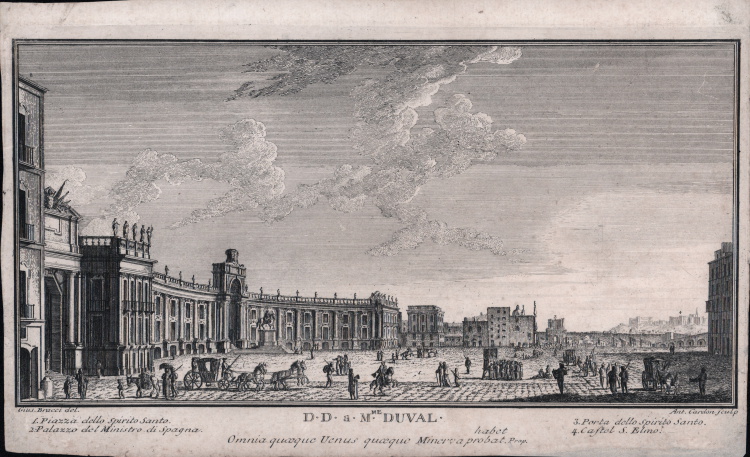



| Reference: | S40788 |
| Author | Antoine CARDON |
| Year: | 1774 |
| Zone: | Naples |
| Printed: | Naples |
| Measures: | 270 x 160 mm |


| Reference: | S40788 |
| Author | Antoine CARDON |
| Year: | 1774 |
| Zone: | Naples |
| Printed: | Naples |
| Measures: | 270 x 160 mm |
View taken from the famous Raccolta delle più interessanti vedute della città di Napoli e luoghi circonvicini. Disegnate da Giuseppe Bracci ed incise in N. XXX rami da Antonio Cardoni published by Gervasi, Naples, 1774.
Altogether a collection of 30 views of Naples and its surroundings. The tables, beautifully printed and well animated, documenting the landscape and life of Naples in the second half of the eighteenth century. In the lower margin of each table is indicated the name of the personage to whom it is dedicated and the place of reference.
Etching, with thin margins, in good condition.
|
Pane & Valerio, La citta di Napoli, tra vedutismo e cartografia (1987); Pane, Le grandi vedute di Napoli di Antoine Cardon 1739-1822 (1998); Negro Spina, Napoli nel Settecento: le incisioni di Antoine Alexandre Cardon (1989).
|
Antoine CARDON (Bruxelles 1739 - ivi 1822)
|
Antoine-Alexandre-Joseph Cardon, also known as Cardon the elder to distinguish him from his son Anthony Cardon, was a Belgian painter, portraitist and engraver. He was a student of Hyacinthe de La Peyne, painter to empress Maria-Theresa I of Hungary, and once followed his teacher to Vienna. Thanks to the protection of Charles de Cobenzl, Maria-Theresa's minister-plenipotentiary in Brussels, Cardon became a pensionary of the government and was thus able to stay for a time in Rome and Naples.
Recalled to Brussels by Cobenzl, he became a professor at the Académie Royale des Beaux-Arts and made his artistic career in the city - his pupils included Adèle Kindt. It was there in 1810 that he and Antoine Brice founded an association of professional and amateur artists. In 1822 Cardon was named a member of the Royal Institute of the Netherlands by William II of the Netherlands.
He was a highly enthusiastic member of Freemasonry, then having great success in the nobility of the Austrian Netherlands - his name is among the first initiates of the "loge de l'Union" and he engraved several Masonic diplomas and emblems.
|
|
Pane & Valerio, La citta di Napoli, tra vedutismo e cartografia (1987); Pane, Le grandi vedute di Napoli di Antoine Cardon 1739-1822 (1998); Negro Spina, Napoli nel Settecento: le incisioni di Antoine Alexandre Cardon (1989).
|
Antoine CARDON (Bruxelles 1739 - ivi 1822)
|
Antoine-Alexandre-Joseph Cardon, also known as Cardon the elder to distinguish him from his son Anthony Cardon, was a Belgian painter, portraitist and engraver. He was a student of Hyacinthe de La Peyne, painter to empress Maria-Theresa I of Hungary, and once followed his teacher to Vienna. Thanks to the protection of Charles de Cobenzl, Maria-Theresa's minister-plenipotentiary in Brussels, Cardon became a pensionary of the government and was thus able to stay for a time in Rome and Naples.
Recalled to Brussels by Cobenzl, he became a professor at the Académie Royale des Beaux-Arts and made his artistic career in the city - his pupils included Adèle Kindt. It was there in 1810 that he and Antoine Brice founded an association of professional and amateur artists. In 1822 Cardon was named a member of the Royal Institute of the Netherlands by William II of the Netherlands.
He was a highly enthusiastic member of Freemasonry, then having great success in the nobility of the Austrian Netherlands - his name is among the first initiates of the "loge de l'Union" and he engraved several Masonic diplomas and emblems.
|